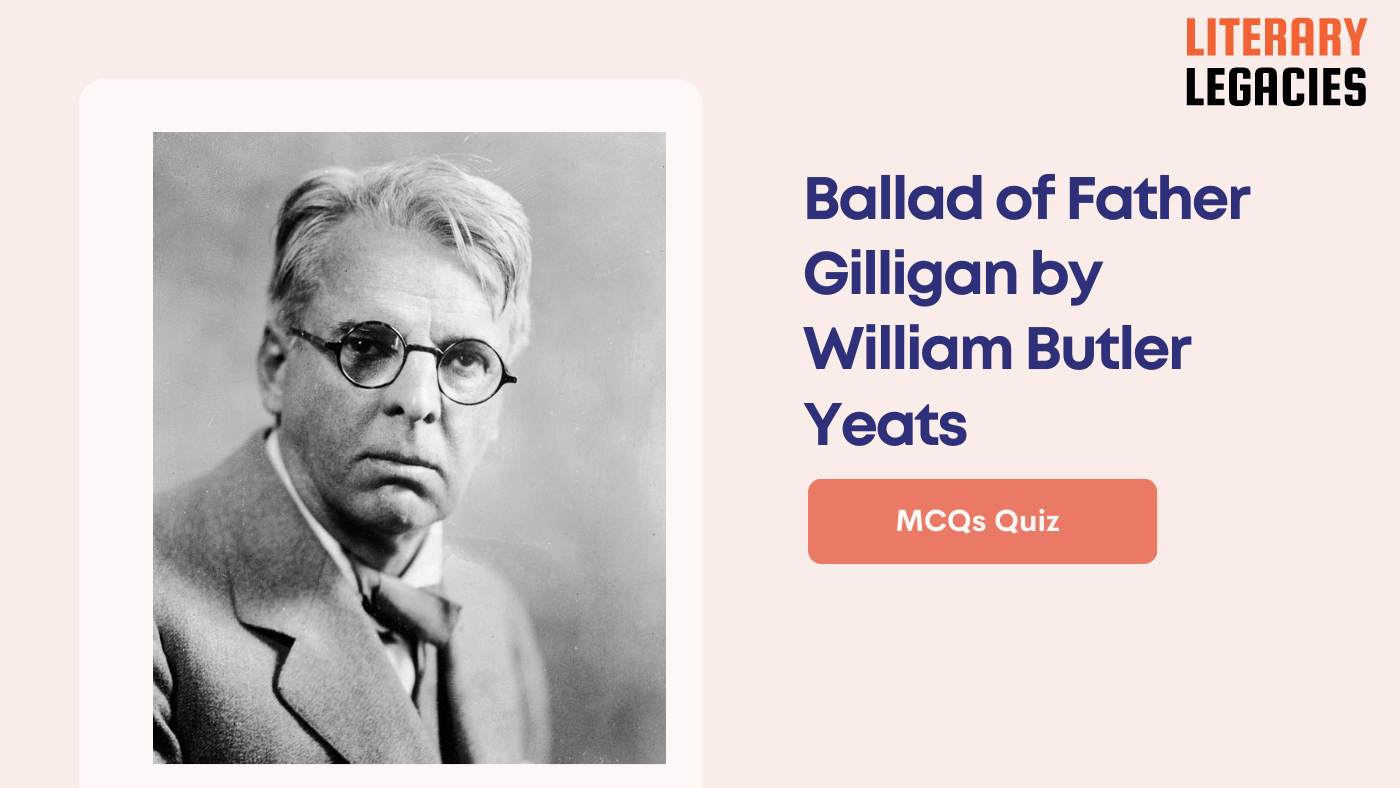1. What is the structure of the poem ‘The Ballad of Father Gilligan’?
A. Six stanzas of six lines
B. Eight stanzas of three lines
C. Twelve stanzas of four lines
D. Ten stanzas of five lines
Answer: Twelve stanzas of four lines (C)
The poem follows a specific rhyming scheme and stanza structure.
2. What is Father Gilligan’s occupation?
A. Doctor
B. Lawyer
C. Teacher
D. Priest
Answer: Priest (D)
Father Gilligan is an old priest who helps his people in need.
3. Why is Father Gilligan tired?
A. Because he helps his people day and night
B. Because he doesn’t get enough sleep
C. Because he doesn’t like his job
D. Because he is old
Answer: Because he helps his people day and night (A)
Father Gilligan’s continuous help to his people makes him very tired.
4. What indicates it is evening in the poem?
A. The presence of insects
B. The stars appearing
C. The sun setting
D. The wind blowing
Answer: The presence of insects (A)
The presence of insects is a sign that it is evening in the poem.
5. What does Father Gilligan do after feeling upset?
A. He runs away from his duties
B. He begs God to forgive him
C. He gets angry with his people
D. He sleeps on his chair
Answer: He begs God to forgive him (B)
Father Gilligan feels sorry for his words and begs God to forgive him.
6. What happens to the insects in the poem?
A. They disappear
B. They start singing
C. They multiply
D. They get angry
Answer: They disappear (A)
The insects go away as night falls and the stars appear.
7. What is the significance of the stars in the poem?
A. They symbolize hope
B. They mark the beginning of the night
C. They indicate the presence of God
D. They are a sign of danger
Answer: They mark the beginning of the night (B)
The stars appearing in the sky signal the start of the night.
8. What did God do to the world at the beginning of the story?
A. Makes a loud noise
B. Shines light on it
C. Covers it with darkness
D. Creates a storm
Answer: Covers it with darkness (C)
The story begins with God covering the world in darkness, indicating the early morning hours.
9. What is indicated by the chirping of sparrows?
A. The early hours of morning
B. The late evening
C. The middle of the day
D. The late afternoon
Answer: The early hours of morning (A)
The chirping of sparrows indicates the early hours of morning.
10. Why is Father Gilligan shocked when he wakes up?
A. He forgot his prayers
B. He slept for a long time
C. He had a bad dream
D. He lost his horse
Answer: He slept for a long time (B)
Father Gilligan is shocked because he slept for a long time and might have missed helping the sick man.
11. How does Father Gilligan ride his horse?
A. Along the beach
B. Rashly over narrow roads and wet lands
C. Slowly and carefully
D. Through the forest
Answer: Rashly over narrow roads and wet lands (B)
Father Gilligan rides his horse rashly over narrow roads and wet lands to reach the sick man’s house quickly.
12. What did the sick man’s wife tell Father Gilligan when he arrived?
A. That her husband was still alive
B. That her husband had died an hour ago
C. That her husband was getting better
D. That her husband was in critical condition
Answer: That her husband had died an hour ago (B)
The sick man’s wife tells Father Gilligan that her husband died an hour ago.
13. What does Father Gilligan say about God?
A. God is a distant being who does not care
B. God is a king who takes care of all the planets
C. God is a judge who punishes sinners
D. God is a vengeful God
Answer: God is a king who takes care of all the planets (B)
Father Gilligan describes God as a king who takes care of all the planets, showing God’s caring nature.
14. Why is Father Gilligan grateful to God?
A. Because God punished him
B. Because God was kind and merciful to him
C. Because God made him ride his horse
D. Because God made him sleep
Answer: Because God was kind and merciful to him (B)
Father Gilligan is grateful to God for being kind and merciful to him despite his mistakes.
15. What is the theme of the poem?
A. The importance of prayer
B. The power of God
C. The role of priests in society
D. The love and care of God for all lives
Answer: The love and care of God for all lives (D)
The poem shows the love and care of God for whom all lives are equal and important.
16. What does Father Gilligan say God might have sent to help him?
A. A messenger
B. A devil
C. An angel
D. A prophet
Answer: An angel (C)
Father Gilligan says that God might have sent one of His angels to help him.
17. What is the emotional state of Father Gilligan when he says, ‘I have no rest, nor joy nor peace’?
A. Indifferent
B. Peaceful
C. Distraught
D. Angry
Answer: Distraught (C)
This shows Father Gilligan’s emotional state as he struggles with his priestly duties.
18. Why does Father Gilligan ask for forgiveness from God?
A. Because he spoke out of turn
B. Because he felt tired
C. Because he was unhappy
D. Because he fell asleep
Answer: Because he spoke out of turn (A)
Father Gilligan feels he should not have spoken his negative thoughts aloud.
19. What occurs in the natural world as night falls?
A. The stars appear in the sky
B. The wind dies down
C. The leaves stop moving
D. The stars disappear
Answer: The stars appear in the sky (A)
The changing of the stars and wind are indicators of the passage of time.
20. What is the significance of the moths and sparrows in the poem?
A. They indicate the passage of time from night to morning
B. They are a distraction from Father Gilligan’s prayers
C. They represent the darkness of the night
D. They symbolize the cycle of life and death
Answer: They indicate the passage of time from night to morning (A)
The moths and sparrows serve as a natural clock, marking the transition from night to morning.
21. What does Father Gilligan do after saying he has no rest, joy, nor peace?
A. He asks for forgiveness from God
B. He starts crying
C. He starts praying
D. He goes to sleep
Answer: He starts praying (C)
Father Gilligan’s prayer is a way of seeking comfort and solace.
22. What did the woman tell Father about the sick man?
A. He was recovering.
B. He died an hour ago.
C. He was critically ill.
D. He was in a coma.
Answer: He died an hour ago. (B)
The woman’s words had a profound impact on Father’s emotional state.
23. How did the sick man die according to the woman?
A. Happily like a bird.
B. Suddenly.
C. In his sleep.
D. In agony.
Answer: Happily like a bird. (A)
The woman’s description of the sick man’s death seemed to bring comfort to Father.
24. What did Father do when he heard the woman’s words?
A. He nodded silently.
B. He walked away slowly.
C. He cried out in anguish.
D. He knelt down.
Answer: He knelt down. (D)
Father’s actions revealed his emotional response to the news.
25. What did Father realize when he heard about the sick man’s death?
A. That he had failed in his duty.
B. That God had sent another priest in his place.
C. That God had abandoned him.
D. That the sick man’s wife was lying.
Answer: That God had sent another priest in his place. (B)
Father’s realization brought him a sense of acceptance and understanding.
26. What was Father’s emotional state after hearing about the sick man’s death?
A. Sad and restless.
B. Peaceful and relieved.
C. Shocked and terrified.
D. Angry and frustrated.
Answer: Sad and restless. (A)
Father’s emotions were complex and multifaceted.



